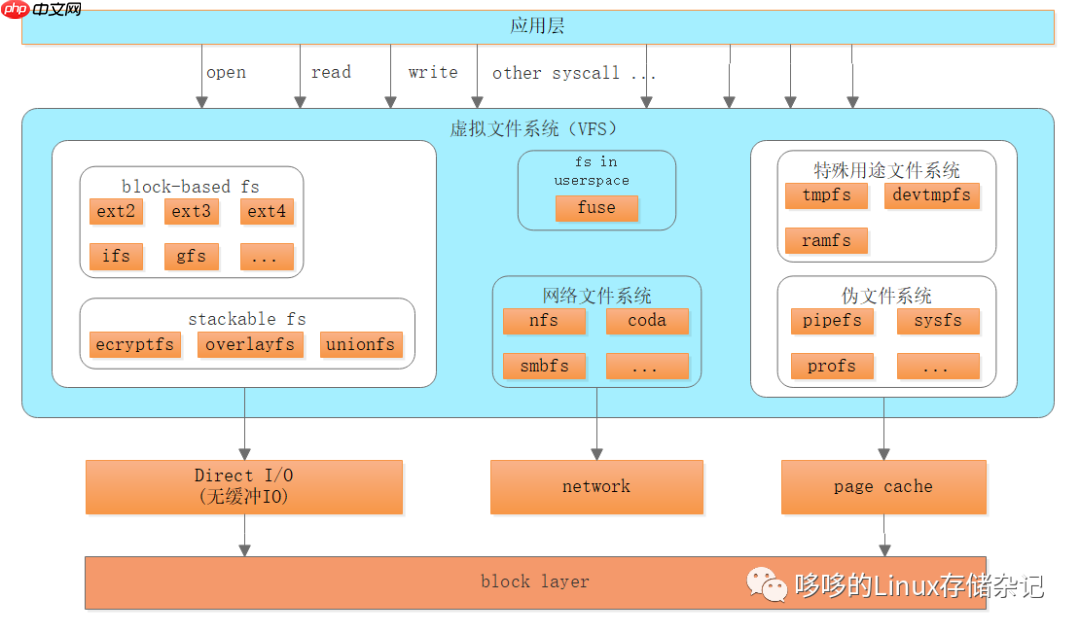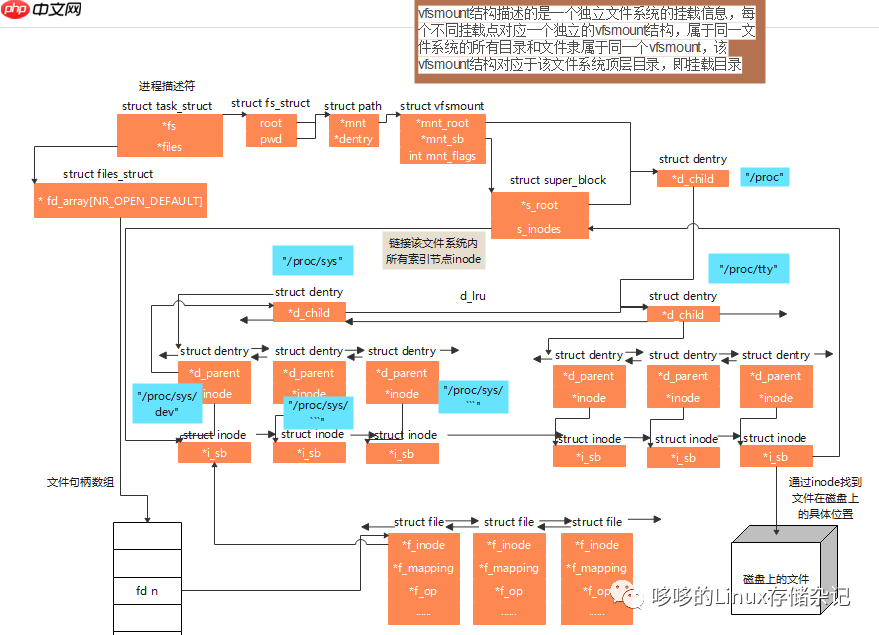前言
为什么 Linux 内核支持如此多种类的文件系统,并且都能顺利挂载呢?为什么可以在系统中直接挂载其他文件系统,甚至将 Windows 下的文件夹挂载到 Linux 上?Linux 的虚拟文件系统(VFS)为何如此强大?这都归功于其精妙的数据结构设计。似乎有个说法,Linux 有什么解决不了的问题?就加一层。

VFS 是什么?虚拟文件系统,简称 VFS(Virtual Filesystem),是内核中的一个软件层。
VFS 的作用可以概括为两点:
VFS 支持的文件系统类型如下列出一些常见的文件系统类型,本文暂不进行详细分析。
VFS 的设计思想 VFS 设计的初衷是支持所有的文件系统,因此其设计思想是采用面向对象的方式,设计一个通用的文件模型。尽管出于效率考虑,VFS 是用 C 语言编写的。在通用文件系统模型中,每个目录也被视为一个文件,可以包含若干文件和其他子目录。因此,Linux 有一句经典的话:一切皆文件。
关键数据结构介绍 Linux VFS 抽象出四种类型的数据结构,以实现将不同类型的文件系统挂载到目录结构中。
超级块对象 对于磁盘类文件系统,超级块是存放在磁盘上的文件系统控制块,里面存放已安装文件系统的相关信息。换句话说,一个超级块描述了一个具体文件系统的信息,其中的信息非常重要,也称为元数据。与普通的文件数据相比,元数据的丢失会损坏整个文件系统,导致无法挂载等问题。当然,不仅超级块,inode 上也有许多元数据。
struct super_block {
struct list_head s_list; // 超级块链表指针
dev_t s_dev; // 设备标识符
unsigned char s_blocksize_bits; // 以位为单位的块的大小
unsigned long s_blocksize; // 以字节为单位的块大小
loff_t s_maxbytes; // 文件大小的上限
struct file_system_type *s_type; // 指向文件系统的 file_system_type 数据结构的指针
const struct super_operations *s_op; // 超级块方法
const struct dquot_operations *dq_op; // 磁盘限额方法
const struct quotactl_ops *s_qcop; // 限额控制方法
const struct export_operations *s_export_op; // 导出方法
unsigned long s_flags; // 登录标志
unsigned long s_magic; // 文件系统的魔术字
struct dentry *s_root; // 目录登录点
struct rw_semaphore s_umount; // 卸载信号量
int s_count; // 超级块引用计数
atomic_t s_active; // 活动引用记数
#ifdef CONFIG_SECURITY
void *s_security; // 安全模块
#endif
const struct xattr_handler **s_xattr;
struct list_head s_inodes; // 把所有索引对象链接在一起,存放的是头结点
struct hlist_bl_head s_anon; // 匿名目录项
struct list_head s_mounts; /* list of mounts; _not_ for fs use */
struct block_device *s_bdev; // 相关的块设备
struct backing_dev_info *s_bdi;
struct mtd_info *s_mtd;
struct hlist_node s_instances; // 该类型文件系统
unsigned int s_quota_types; /* Bitmask of supported quota types */
struct quota_info s_dquot; // 限额相关选项
struct sb_writers s_writers;
char s_id[32]; /* Informational name */
u8 s_uuid[16]; /* UUID */
void *s_fs_info; /* Filesystem private info */
unsigned int s_max_links;
fmode_t s_mode;
u32 s_time_gran;
struct mutex s_vfs_rename_mutex; /* Kludge */
char *s_subtype;
char __rcu *s_options;
const struct dentry_operations *s_d_op; /* default d_op for dentries */
int cleancache_poolid;
struct shrinker s_shrink; /* per-sb shrinker handle */
atomic_long_t s_remove_count;
int s_readonly_remount;
struct workqueue_struct *s_dio_done_wq;
struct hlist_head s_pins;
struct list_lru s_dentry_lru ____cacheline_aligned_in_smp;
struct list_lru s_inode_lru ____cacheline_aligned_in_smp;
struct rcu_head rcu;
int s_stack_depth;
};索引节点对象(inode) 索引节点存放关于具体文件的一般信息。对于磁盘类文件系统,索引节点也是存放在磁盘上的文件控制块。每个索引节点都有一个索引节点号,这个节点号唯一地标识了文件系统中的文件。
struct inode {
umode_t i_mode; // 访问权限控制
unsigned short i_opflags;
kuid_t i_uid; // 使用者的 id
kgid_t i_gid; // 使用组 id
unsigned int i_flags; // 文件系统标志
#ifdef CONFIG_FS_POSIX_ACL
struct posix_acl *i_acl;
struct posix_acl *i_default_acl;
#endif
const struct inode_operations *i_op; // 指向索引结点操作结构体的指针
struct super_block *i_sb; // 指向 inode 所属文件系统的超级块的指针
struct address_space *i_mapping; // 相关的地址映射
#ifdef CONFIG_SECURITY
void *i_security; // 安全模块
#endif
unsigned long i_ino; // 索引结点号。通过 ls -i 命令可以查看文件的索引节点号
union {
const unsigned int i_nlink; // 硬链接数
unsigned int __i_nlink;
};
dev_t i_rdev; // 实际设备标识符号
loff_t i_size; // 以字节为单位
struct timespec i_atime; // 最后访问时间
struct timespec i_mtime; // 最后修改时间
struct timespec i_ctime; // 最后改变时间
spinlock_t i_lock; /* i_blocks, i_bytes, maybe i_size */
unsigned short i_bytes; // 使用的字节数
unsigned int i_blkbits; // 以位为单位的块大小
blkcnt_t i_blocks; // 文件的块数
#ifdef __NEED_I_SIZE_ORDERED
seqcount_t i_size_seqcount;
#endif
unsigned long i_state; // 状态标志
struct mutex i_mutex;
unsigned long dirtied_when; // 首次修改时间
unsigned long dirtied_time_when;
struct hlist_node i_hash; // 散列表
struct list_head i_wb_list; /* backing dev IO list */
struct list_head i_lru; /* inode LRU list */
struct list_head i_sb_list; // 链接一个文件系统中所有 inode 的链表
union {
struct hlist_head i_dentry; // 目录项链表
struct rcu_head i_rcu;
};
u64 i_version; // 版本号
atomic_t i_count; // 引用计数
atomic_t i_dio_count;
atomic_t i_writecount; // 写者计数
#ifdef CONFIG_IMA
atomic_t i_readcount; /* struct files open RO */
#endif
const struct file_operations *i_fop; /* former ->i_op->default_file_ops */
struct file_lock_context *i_flctx;
struct address_space i_data; // 设备地址映射
struct list_head i_devices; // 块设备链表
union {
struct pipe_inode_info *i_pipe; // 管道信息
struct block_device *i_bdev; // 块设备
struct cdev *i_cdev; // 字符设备
};
__u32 i_generation; // 索引节点版本号
#ifdef CONFIG_FSNOTIFY
__u32 i_fsnotify_mask; /* all events this inode cares about */
struct hlist_head i_fsnotify_marks;
#endif
void *i_private; /* fs or device private pointer */
};目录项对象(dentry) 存放 dentry 与对应文件链接的相关信息,每个 dentry 代表路径中的一个特定部分,每个磁盘类文件系统以自己的方式将目录项信息存放在磁盘上。
struct dentry {
/* RCU lookup touched fields */
unsigned int d_flags; /* protected by d_lock */
seqcount_t d_seq; /* per dentry seqlock */
struct hlist_bl_node d_hash; /* lookup hash list */
struct dentry *d_parent; /* parent directory */
struct qstr d_name;
struct inode *d_inode; /* Where the name belongs to - NULL is negative */
unsigned char d_iname[DNAME_INLINE_LEN]; /* small names */
/* Ref lookup also touches following */
struct lockref d_lockref; /* per-dentry lock and refcount */
const struct dentry_operations *d_op;
struct super_block *d_sb; /* The root of the dentry tree */
unsigned long d_time; /* used by d_revalidate */
void *d_fsdata; /* fs-specific data */
struct list_head d_lru; /* LRU list */
struct list_head d_child; /* child of parent list */
struct list_head d_subdirs; /* our children */
/* * d_alias and d_rcu can share memory */
union {
struct hlist_node d_alias; /* inode alias list */
struct rcu_head d_rcu;
} d_u;
};文件对象(file) 存放被打开文件与进程间交互的信息,这类信息仅当进程访问文件期间存放在内存中。
struct file {
union {
struct llist_node fu_llist; // 每个文件系统中被打开的文件都会形成一个双链表
struct rcu_head fu_rcuhead;
} f_u;
struct path f_path;
struct inode *f_inode; /* cached value */
const struct file_operations *f_op; // 指向文件操作表的指针
spinlock_t f_lock;
atomic_long_t f_count; // 文件对象的使用计数
unsigned int f_flags; // 打开文件时所指定的标志
fmode_t f_mode; // 文件的访问模式
struct mutex f_pos_lock;
loff_t f_pos; // 文件当前的位移量
struct fown_struct f_owner;
const struct cred *f_cred;
struct file_ra_state f_ra; // 预读状态
u64 f_version; // 版本号
#ifdef CONFIG_SECURITY
void *f_security; // 安全模块
#endif
/* needed for tty driver, and maybe others */
void *private_data;
#ifdef CONFIG_EPOLL
/* Used by fs/eventpoll.c to link all the hooks to this file */
struct list_head f_ep_links;
struct list_head f_tfile_llink;
#endif /* #ifdef CONFIG_EPOLL */
struct address_space *f_mapping; // 页缓存映射
} __attribute__((aligned(4))); /* lest something weird decides that 2 is OK */
struct file_handle {
__u32 handle_bytes;
int handle_type; /* file identifier */
unsigned char f_handle[0];
};数据结构组织关系图 
以上就是通俗易懂!快速了解虚拟文件系统(VFS)的详细内容,更多请关注php中文网其它相关文章!

每个人都需要一台速度更快、更稳定的 PC。随着时间的推移,垃圾文件、旧注册表数据和不必要的后台进程会占用资源并降低性能。幸运的是,许多工具可以让 Windows 保持平稳运行。




Copyright 2014-2025 https://www.php.cn/ All Rights Reserved | php.cn | 湘ICP备2023035733号